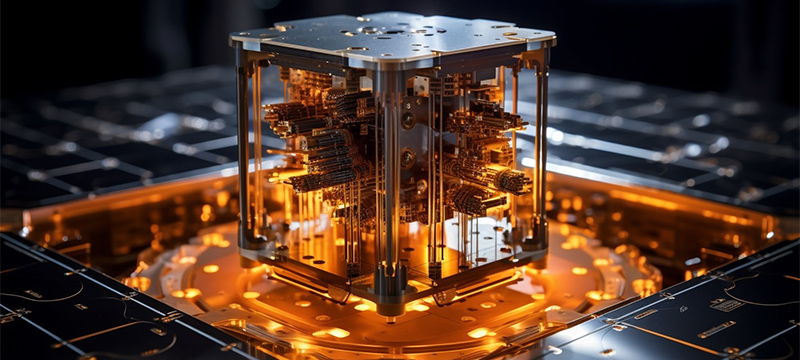

The intersection of quantum computing and the Internet of Things (IoT) is poised to reshape the future of connected devices, bringing both exciting opportunities and serious cybersecurity concerns. A recent article published on QuantumWorld.news, titled The Quantum Impact on IoT: Opportunities, Threats, and the Future of Connected Devices, provides an in-depth look at how quantum advancements could affect the IoT landscape.
As IoT devices continue to proliferate—spanning everything from smart home appliances to industrial automation and healthcare monitoring—quantum computing is emerging as a game-changing force that could dramatically enhance processing power, optimize networks, and improve artificial intelligence applications. However, this transformation is not without risk. The potential for quantum computers to break existing encryption standards presents one of the biggest security challenges IoT has ever faced.
Let’s take a closer look at the key takeaways from the article and explore what they mean for the future of IoT.
Quantum Computing: A New Computational Era for IoT
One of the most compelling advantages of quantum computing in IoT is its ability to handle vast amounts of data more efficiently than classical computing. With billions of IoT devices generating real-time data streams, the ability to process, analyze, and derive insights from this data is becoming increasingly difficult.
The article highlights how quantum computing could accelerate AI-driven analytics, improve pattern recognition, and enable faster decision-making in industries reliant on IoT. For example:
- Predictive Maintenance in Industrial IoT (IIoT): Quantum-enhanced machine learning could identify faults in manufacturing equipment before they cause downtime.
- Smart Cities & Traffic Management: Quantum algorithms could optimize traffic flow by analyzing data from connected vehicles and sensors in real time.
- Supply Chain & Logistics: Quantum-powered simulations could refine delivery routes, reduce inefficiencies, and enhance warehouse automation.
These improvements are not just theoretical—major tech companies like IBM, Google, and Honeywell are already working on practical applications of quantum computing that could eventually benefit IoT. However, the timeline for these advancements remains uncertain.
The Quantum Security Dilemma for IoT
While quantum computing holds the potential to enhance IoT performance, the article from QuantumWorld.news underscores a critical security risk: the vulnerability of current encryption methods to quantum attacks.
Most IoT devices today use RSA and Elliptic Curve Cryptography (ECC) to secure data transmissions. Quantum computers, armed with Shor’s Algorithm, could break these encryption protocols, leaving IoT networks open to exploitation.
The “Harvest Now, Decrypt Later” Threat
A particularly alarming scenario described in the article is that cybercriminals and nation-states may already be intercepting and storing encrypted IoT data. While they may not currently have the means to decrypt this data, once sufficiently powerful quantum computers emerge, they could retrospectively unlock sensitive IoT communications. This means that data being collected today may be vulnerable in the future.
Potential Quantum-Resistant Security Solutions
The article suggests several quantum-resistant security measures that could help protect IoT networks:
- Post-Quantum Cryptography (PQC): A new set of encryption protocols designed to withstand quantum attacks.
- Quantum Key Distribution (QKD): A technique using quantum mechanics to create encryption keys that cannot be intercepted without detection.
- Quantum Random Number Generators (QRNGs): Generating truly random encryption keys to strengthen IoT security.
While these solutions show promise, their adoption across the vast IoT ecosystem will take time and significant investment.
Quantum Computing and IoT Edge Networks
Another aspect discussed in the article is how quantum computing could revolutionize edge computing. As IoT devices generate increasing amounts of data, processing everything in centralized cloud environments is becoming inefficient.
Quantum computing could help optimize edge computing by improving real-time data analysis and reducing energy consumption in IoT devices. For example:
- Faster response times for autonomous vehicles that rely on edge computing for navigation and decision-making.
- More efficient smart grids that dynamically balance energy supply and demand using quantum-powered simulations.
While these applications are still speculative, the potential benefits for IoT are clear.
Challenges to Quantum Adoption in IoT
Despite its promise, the integration of quantum computing into IoT won’t happen overnight. The article from QuantumWorld.news highlights several key challenges:
- Hardware Limitations: Quantum computers require highly specialized conditions, such as near-absolute-zero temperatures, making them impractical for widespread deployment in IoT environments in the near term.
- Cost and Accessibility: Currently, quantum computing is expensive and primarily accessible to large corporations and research institutions. Bringing quantum capabilities to mainstream IoT applications will require significant advancements in quantum hardware scalability.
- Lack of Standardization: There are no universal standards for integrating quantum computing into IoT security frameworks. Governments and industry leaders must establish clear guidelines to ensure secure and ethical implementation.
Preparing for the Quantum-IoT Future
The article concludes with a call to action for businesses, IoT developers, and policymakers to start preparing for the quantum era today. Key recommendations include:
- Investing in quantum-safe encryption: Transitioning to post-quantum cryptography should be a priority for organizations handling sensitive IoT data.
- Exploring hybrid quantum-classical systems: Since full-scale quantum computing is still years away, developing hybrid approaches that combine classical and quantum processing could provide a stepping stone.
- Monitoring quantum advancements: Keeping track of breakthroughs in quantum error correction, security, and scalability will be essential for making informed decisions about IoT infrastructure.
Final Thoughts: Is IoT Ready for the Quantum Leap?
The article from QuantumWorld.news provides an insightful and thought-provoking analysis of how quantum computing could transform the IoT landscape. While the opportunities for enhanced AI, real-time processing, and optimization are promising, the risks—especially in security—demand urgent attention.
For now, quantum computing is still in its early stages, but its rapid progress means that IoT stakeholders must start preparing today. Whether quantum computing becomes an IoT enabler or a security nightmare depends on how industries and governments anticipate and adapt to the coming quantum revolution.
As IoT continues to expand into every aspect of our lives, one thing is clear: the future of connected devices will be shaped, in part, by quantum technology.
The post Quantum Computing and IoT: A Future of Promise and Peril appeared first on IoT Business News.

